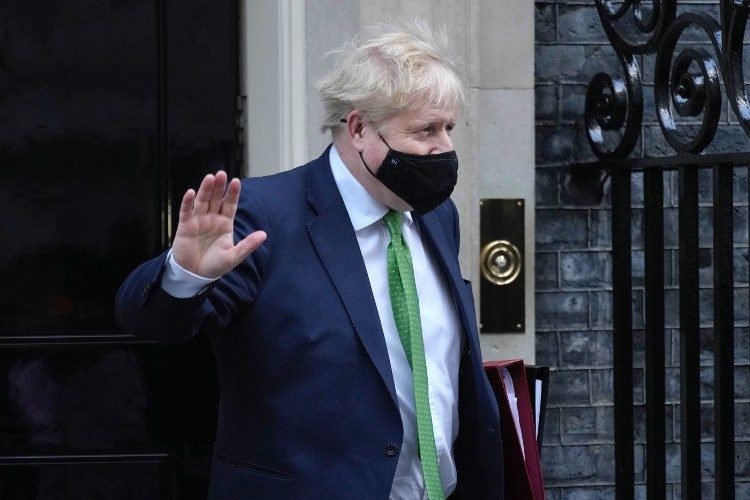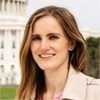
Nearly all COVID-related restrictions will be dropped in the United Kingdom next week, U.K. Prime Minister Boris Johnson announced Wednesday, citing the Omicron wave passing its peak and praising his country’s high vaccination and booster rates.
Speaking before the House of Commons, Johnson said, “Many nations across Europe have endured further winter lockdowns but this government took a different path,” adding that his government made the “toughest decisions right.”
In his speech, Johnson reviewed Britain’s so-called Plan B measures that were imposed after the new Omicron variant was detected last November in South Africa. Citing the latest data on COVID infection and hospitalization rates dropping nationwide, and the “doubled speed” of booster programs, the prime minister declared the country can “return to ‘Plan A’ in England and allow ‘Plan B’ regulations to expire.”
Last September, the U.K. introduced two possible strategies to “manage COVID-19” in the autumn-winter season. Plan A, which was in place until Omicron was detected, included a few restrictions, such as requirements for self-isolation if infected, but allowed for businesses and schools to remain open. COVID vax passports were not required by the government. Plan B was reserved for the “rapid and unexpected” changes to COVID infections’ trajectory. It was implemented in December in a bid to stop the spread of Omicron.
Saying that U.K. “scientists believe it is likely that the Omicron wave has now peaked nationally,” Johnson announced the following updates:
1. Mandatory certification, or COVID passports, will be dropped. Brits aged 18 and over no longer need to “show their papers” to attend public places and events previously covered by Plan B, such as nightclubs, indoor events with 500 or more attendees, outdoor crowded settings with 4,000 or more attendees, and any settings with 10,000 or more participants. Johnson reserved the right of the businesses to require vaccine passport of their patrons.
2. Brits are no longer required working from home, effective immediately.
3. Facemasks and other face coverings will not be required in any setting. Under Plan B, mask wearing was mandatory in most of indoor settings and on public transport. British school children are be able to unmask in schools as of Thursday, January 20.
The government will continue to recommend that people mask up in enclosed or crowded places, but in general, Johnson stressed, “We will trust the judgment of the British people and no longer criminalize those who chose no to wear one.”
4. Restrictions preventing people from visiting care homes will be eliminated.
A requirement for those who tested positive for COVID to self-isolate will remain in place, but the isolation time will be reduced to five days. COVID-positive folks will need two negative COVID tests to confirm recovery. Drawing parallels to the government not forcing people infected with flu to isolate, Johnson said there may “soon come a time” when self-isolation due to COVID becomes unnecessary and those with the virus will simply need to be “careful and considerate of others.” The regulation is set to expire on March 24.
While projecting optimism that the pandemic is transforming into an endemic disease — meaning the infection will rate will remain low and occur regularly in certain areas according to established patterns while posing no urgent threat to public health — Johnson concluded that “we must all remain cautious during these last days of winter. With over 16,000 people still in hospital in England alone, the pandemic is not over.” He added that Omicron is not a “mild disease,” especially for the unvaccinated, as he noted that over 90 percent COVID patients in ICU are “not boosted.”
Johnson arguably tried to equate “unvaccinated” with “not boosted,” though the U.K does not yet include boosters in its definition of “fully vaccinated.” Johnson signaled back in November that the definition of “fully vaccinated” should be revised to include receiving boosters, yet gave no timeframe for that move. This, despite the fact that in November, fully vaccinated Brits did not fare well against the virus and accounted for 82 percent of COVID deaths and 66 percent of hospitalizations, per official government data.
Johnson finished by saying that the U.K. government would soon be publishing a “long term strategy for living with COVID-19,” which would be centered around the protection of “our liberty and avoid restrictions in future by relying instead on medical advances,” such as vaccines.
Johnson’s political opponents from the Labour Party said they supported the policy, “as long as the science says it is safe.”
Johnson’s announcement comes amid major political struggles for the prime minister after revelations of lockdown-violating parties at his official residency at 10 Downing Street back at the onset of the pandemic, when the government imposed strict stay-at-home orders. Johnson and members and staff of his cabinet were exposed for violating the own draconian rules, and opposition politicians called on Johnson to resign. The news was also met with “revolt” among members of his own Conservative Party, per a BBC report.
Reportedly, other European countries have had enough with COVID restrictions as well. Among them is Spain, which is calling on European nations to treat COVID like the seasonal flu. Per Yahoo! News:
“Spain wants to lead this debate because it is timely and necessary to do so,” Health Minister Carolina Darias has said, adding that Spain asked the European Centre for Disease Prevention (ECDC) to “study new strategies” to deal with Covid.
Spanish Prime Minister Pedro Sanchez said this week that he is looking to shift from “managing a pandemic to managing a disease which we hope science will reclassify as an endemic illness,” per the outlet.
In the meantime, the Biden administration announced Wednesday a push for people to wear respirators nearly two years into the pandemic, and will distribute 400 million N95 respirators to pharmacies and community sites across the nation. The administration is calling it “the largest deployment of protective equipment in U.S. history.”




